常见名词和动词形式装换
- 格式:doc
- 大小:35.50 KB
- 文档页数:3

英语单词词性转换一、动词(v.)→名词(n.)1、词尾加上-er或-or之后就变成了表示"某一类人"的名词例如:work—worker, teach—teacher, sing—singer,jump—jumper, play—player, learn—learner,visit—visitor, invent—inventor,collect—collector等.注意:1)以不发音的e结尾的动词,在词尾加-r.例如:drive—driver, write—writer等.2)以辅音字母开头并以元音字母加辅音字母结尾的单词,应双写末尾的辅音字母再加er。
例如:run—runner, win—winner,begin—beginner等.2.在动词词尾加上-ment 变成名词例如:achieve—achievement (成就)advertise—advertisement//advertising(广告)agree—agreement disagree—disagreementamuse—amusement (娱乐) improve—improvement(争吵)commit(奉献)—commitment develop—development (发展)有些单词比较特殊,需把动词后的e去掉再加ment.例如:argue—argument(争论)3.在动词词尾加上-(t)ion/(s)ion变成名词例如: attract—attraction; instruct—instruction;invent—invention discuss—discussion;express—expression educate—education;graduate—graduation; operate—operation (去e再加"ion")compete—competition; organize—organization (把e改成其他字母再加"tion")decide—decision conclude—conclusion (把de改为s再加"ion")describe—description描写,描绘 (这是特例,不规则变化)4.在动词词尾加上-ance变成名词例如: appear—appearance (外貌;出现)perform—performance (演出)accept—acceptance (接受)resist-resistance n.抵抗,阻力5.在动词词尾加-ing变成名词 (方法与动词变为现在分词的方法相同)例如:meet—meeting build—building wait—waitingbathe—bathing say—saying(谚语) mean—meaning注意:以辅音字母开头并以元音字母加辅音字母结尾的单词,应双写末尾的辅音字母再加-ing如:swim—swimming shop—shopping begin—beginning二、动词(v.)→形容词(adj.)1.动词后面加able,以e结尾的动词则去e加able,表示具有此性质,特点或属性.例如: afford-affordable;love-lovable2.动词后面加ed,以e结尾的动词则直接加d,表示被动性的属性或特点.例如: scatter-scattered use-used3不规则的动词则必须记忆,记住其过去分词形式.规律不大,意义同(b).三.名词(n.)→形容词(adj.)1.在名词后面加-y可以变成形容词(尤其是一些与天气有关的名词)例如: rain—rainy, cloud—cloudy, wind—windy, snow—snowy,health—healthy, luck—lucky,anger—angry guilt—guilty(内疚的)tourist—touristy(游客多的) , salt (盐)—salty (咸的)silk(丝绸)—silky(丝绸般的), sleep—sleepy (昏昏欲睡的)注意:1)如果以辅音字母开头并以元音字母加辅音字母结尾,这时应双写辅音字母再加"-y".如: sun—sunny, fun—funny, fog—foggy(有雾的), fur—furry(毛皮的)2)少数以不发音的e结尾的名词变为形容词时,应去掉e再加"-y".如: noise—noisy, ice—icy, shine—shiny(发亮的), taste(口味)—tasty(甜的) 2.名词后面加-ed,以e结尾的直接加d.例如: spot(斑点)—spotted(有斑点的); talent—talented (有天赋的)organize—organized 有组织的; balance—balanced(平衡的)3.一些抽象名词在词尾加-ful可以变为形容词例如:care—careful, thank—thankful, help—helpful,use—useful, meaning—meaningful4.在名词后加-less构成含有否定意义的形容词例如:care—careless(粗心的), use—useless(无用的)hope—hopeless(没希望的),home—homeless(无家可归的)5.一些以-ce结尾的名词,把-ce改为-t变成形容词例如: difference—different, silence—silent, confidence—confident6.在名词后加-ly变为形容词例如: friend—friendly, love—lovely, live---lively7.在名词后加-ous变为形容词例如: danger—dangerous prosperous a 繁荣的(pro 在前+sper 希望+ous)8.名词后面加-al变为形容词例如: music—musical; medicine—medical (这个比较特殊)9名词后面加-able变为形容词,如果以e结尾就去e再加"-able".例如: adjust—adjustable 可调整的 value—valuable有价值的10.名词后面加-en变成形容词例如: wood—wooden 木制的 wool—woolen 羊毛的四.形容词(adj.)→副词(adv.)▲一般在形容词的词尾加-ly可以变成副词例如: quick—quickly, slow—slowly, loud—loudly, sudden—suddenly 等例如:possible—possibly, terrible—terribly欢迎您的下载,资料仅供参考!致力为企业和个人提供合同协议,策划案计划书,学习资料等等打造全网一站式需求。
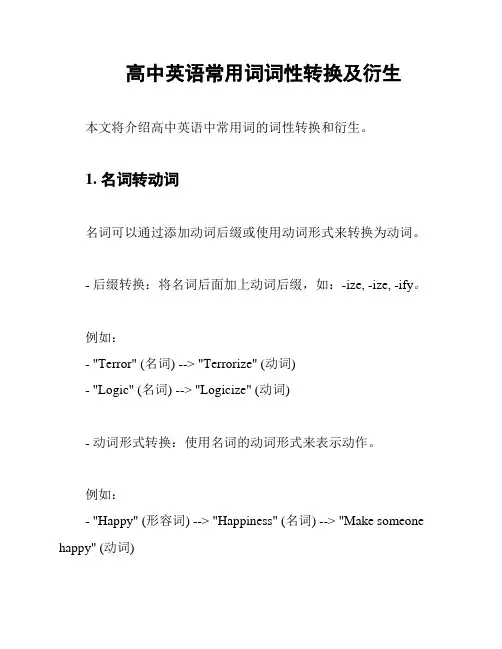
高中英语常用词词性转换及衍生本文将介绍高中英语中常用词的词性转换和衍生。
1. 名词转动词名词可以通过添加动词后缀或使用动词形式来转换为动词。
- 后缀转换:将名词后面加上动词后缀,如:-ize, -ize, -ify。
例如:- "Terror" (名词) --> "Terrorize" (动词)- "Logic" (名词) --> "Logicize" (动词)- 动词形式转换:使用名词的动词形式来表示动作。
例如:- "Happy" (形容词) --> "Happiness" (名词) --> "Make someone happy" (动词)2. 动词转名词动词可以通过添加名词后缀或使用名词形式来转换为名词。
- 后缀转换:将动词后面加上名词后缀,如:-tion, -ance, -ment。
例如:- "Perform" (动词) --> "Performance" (名词)- "Accept" (动词) --> "Acceptance" (名词)- 名词形式转换:使用动词的名词形式来表示状态或动作。
例如:- "Love" (动词) --> "Love" (名词) --> "Find love" (名词)3. 形容词转副词形容词可以通过添加副词后缀或使用副词形式来转换为副词。
- 后缀转换:将形容词后面加上副词后缀,如:-ly。
例如:- "Quick" (形容词) --> "Quickly" (副词)- "Easy" (形容词) --> "Easily" (副词)- 副词形式转换:使用形容词的副词形式来表示方式或程度。
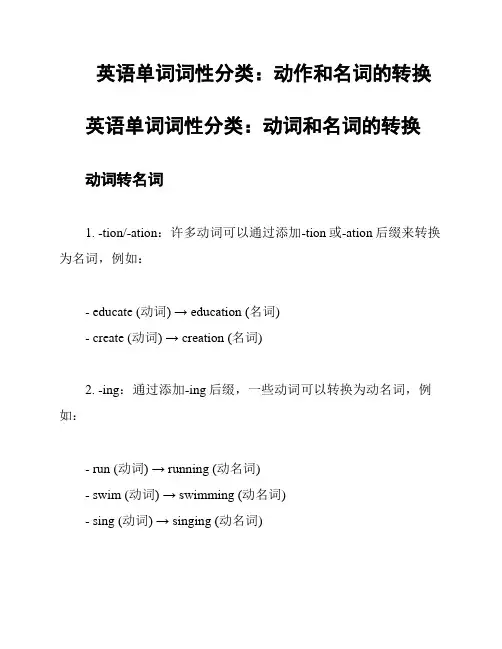
英语单词词性分类:动作和名词的转换英语单词词性分类:动词和名词的转换动词转名词1. -tion/-ation:许多动词可以通过添加-tion或-ation后缀来转换为名词,例如:- educate (动词) → education (名词)- create (动词) → creation (名词)2. -ing:通过添加-ing后缀,一些动词可以转换为动名词,例如:- run (动词) → running (动名词)- swim (动词) → swimming (动名词)- sing (动词) → singing (动名词)3. 不规则变化:还有一些动词转换成名词时存在不规则的变化,例如:- lose (动词) → loss (名词)- win (动词) → win (名词)- teach (动词) → teaching (名词)名词转动词1. -ize/-ise:通过添加-ize或-ise后缀,一些名词可以转换为动词,例如:- globalization (名词) → globalize (动词)- organization (名词) → organize (动词)- realization (名词) → realize (动词)2. 形容词转动词:一些名词也可以通过添加动词to be的形式来转换为动词,例如:- success (名词) → succeed (动词)- failure (名词) → fail (动词)- change (名词) → change (动词)3. 不规则变化:还有一些名词转换成动词时存在不规则的变化,例如:- child (名词) → child (动词)- water (名词) → wa ter (动词)- dog (名词) → dog (动词)以上是英语单词词性分类中,动词和名词的转换方式的简要介绍。
希望对您学习英语有所帮助!。
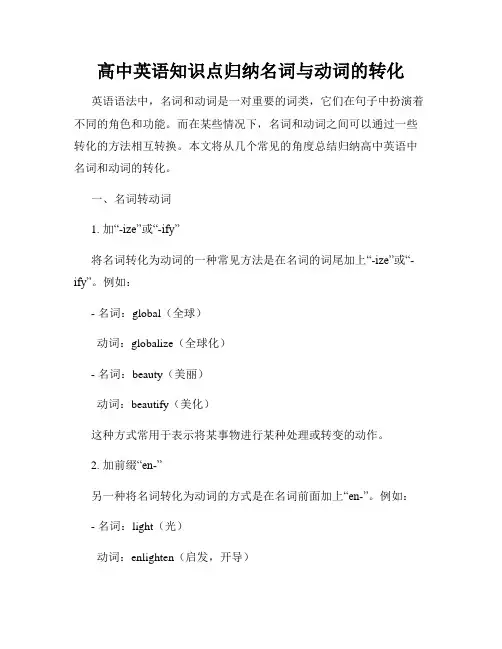
高中英语知识点归纳名词与动词的转化英语语法中,名词和动词是一对重要的词类,它们在句子中扮演着不同的角色和功能。
而在某些情况下,名词和动词之间可以通过一些转化的方法相互转换。
本文将从几个常见的角度总结归纳高中英语中名词和动词的转化。
一、名词转动词1. 加“-ize”或“-ify”将名词转化为动词的一种常见方法是在名词的词尾加上“-ize”或“-ify”。
例如:- 名词:global(全球)动词:globalize(全球化)- 名词:beauty(美丽)动词:beautify(美化)这种方式常用于表示将某事物进行某种处理或转变的动作。
2. 加前缀“en-”另一种将名词转化为动词的方式是在名词前面加上“en-”。
例如:- 名词:light(光)动词:enlighten(启发,开导)- 名词:length(长度)动词:lengthen(延长)这种方式常用于表示使某物具有某种特征或状态。
3. 加前缀“re-”有时,我们还可以通过在名词前面加上“re-”来转化为动词,表示重新做某事。
例如:- 名词:do(工作、任务)动词:redo(重新做)- 名词:build(建造)动词:rebuild(重建)这种方式常用于表示对以前做过的事情进行重复或重新进行。
二、动词转名词1. 加后缀“-ing”最常见的将动词转化为名词的方式是在动词词尾加上“-ing”。
例如:- 动词:run(奔跑)名词:running(跑步)- 动词:write(写)名词:writing(写作)这种方式常用于表示某个动作或状态。
2. 加后缀“-tion”或“-sion”有些动词可以通过在词尾加上“-tion”或“-sion”来转换成相应的名词。
例如:- 动词:inform(通知)名词:information(信息)- 动词:expand(扩大)名词:expansion(扩张)这种方式常用于表示某种行为、结果或状态。
3. 加后缀“-ment”另一种常见的动词转名词的方式是加上“-ment”后缀。
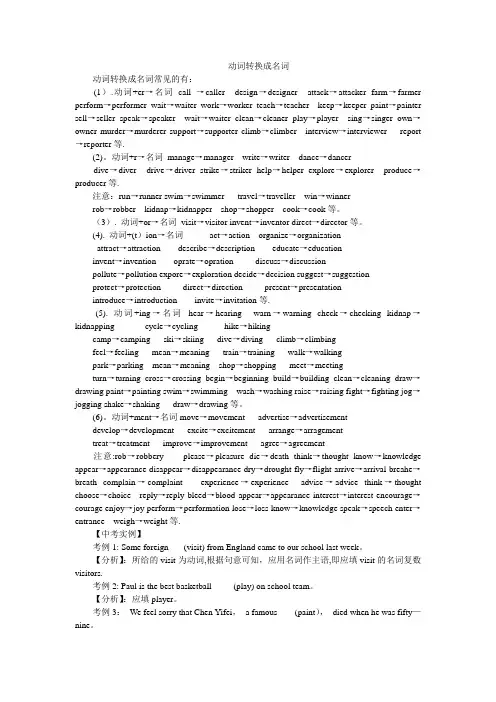
动词转换成名词动词转换成名词常见的有:(1).动词+er→名词call →caller design→designer attack→attacker farm→farmer perform→performer wait→waiter work→worker teach→teacher keep→keeper paint→painter sell→seller speak→speaker wait→waiter clean→cleaner play→player sing→singer own→owner murder→murderer support→supporter climb→climber interview→interviewer report →reporter等.(2)。
动词+r→名词manage→manager write→writer dance→dancerdive→diver drive→driver strike→striker help→helper explore→explorer produce→producer等.注意:run→runner swim→swimmer travel→traveller win→winnerrob→robber kidnap→kidnapper shop→shopper cook→cook等。
(3). 动词+or→名词visit→visitor invent→inventor direct→director等。
(4). 动词+(t)ion→名词act→action organize→organizationattract→attraction describe→description educate→educationinvent→invention oprate→opration discuss→discussionpollute→pollution expore→exploration decide→decision suggest→suggestionprotect→protection direct→direction present→presentationintroduce→introduction invite→invitation等.(5). 动词+ing→名词hear→hearing warn→warning check→checking kidnap→kidnapping cycle→cycling hike→hikingcamp→camping ski→skiing dive→diving climb→climbingfeel→feeling mean→meaning train→training walk→walkingpark→parking mean→meaning shop→shopping meet→meetingturn→turning cross→crossing begin→beginning build→building clean→cleaning draw→drawing paint→painting swim→swimming wash→washing raise→raising fight→fighting jog→jogging shake→shaking draw→drawing等。
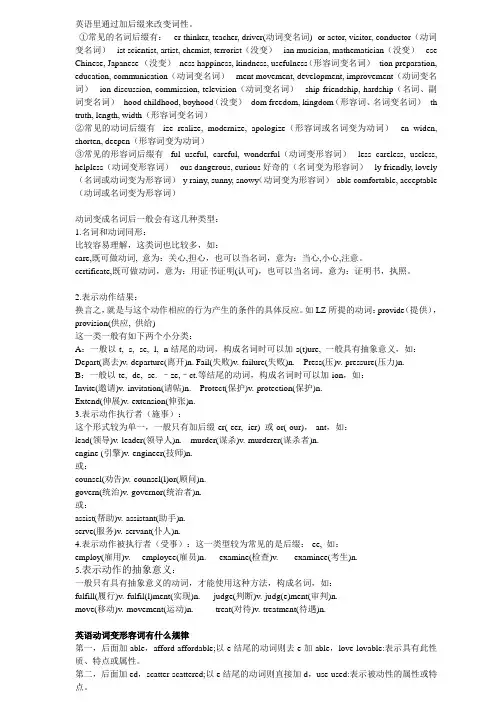
英语里通过加后缀来改变词性。
①常见的名词后缀有:-er thinker, teacher, driver(动词变名词) -or actor, visitor, conductor(动词变名词)-ist scientist, artist, chemist, terrorist(没变)-ian musician, mathematician(没变)-ese Chinese, Japanese (没变)-ness happiness, kindness, usefulness(形容词变名词)-tion preparation, education, communication(动词变名词)-ment movement, development, improvement(动词变名词)-ion discussion, commission, television(动词变名词)-ship friendship, hardship(名词、副词变名词)-hood childhood, boyhood(没变)-dom freedom, kingdom(形容词、名词变名词)-th truth, length, width(形容词变名词)②常见的动词后缀有-ize realize, modernize, apologize(形容词或名词变为动词)-en widen, shorten, deepen(形容词变为动词)③常见的形容词后缀有-ful useful, careful, wonderful(动词变形容词)-less careless, useless, helpless(动词变形容词)-ous dangerous, curious好奇的(名词变为形容词)-ly friendly, lovely (名词或动词变为形容词)-y rainy, sunny, snowy(动词变为形容词)-able comfortable, acceptable (动词或名词变为形容词)动词变成名词后一般会有这几种类型:1.名词和动词同形:比较容易理解,这类词也比较多,如:care,既可做动词, 意为:关心,担心,也可以当名词,意为:当心,小心,注意。
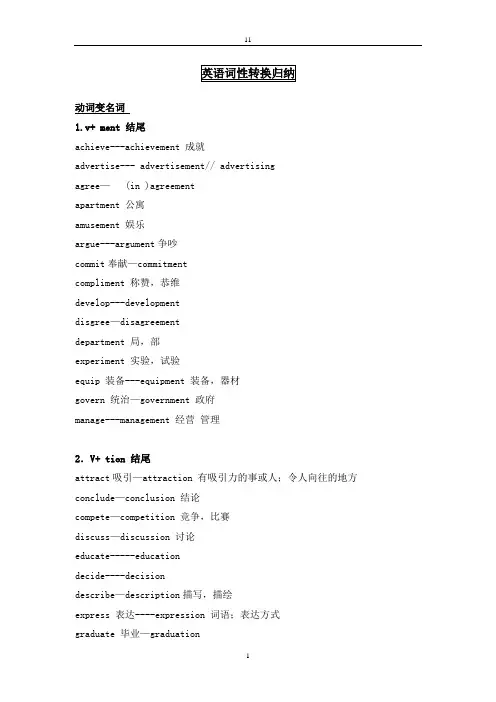
动词变名词1.v+ ment 结尾achieve---achievement 成就advertise--- advertisement// advertisingagree— (in )agreementapartment 公寓amusement 娱乐argue---argument争吵commit奉献—commitmentcompliment 称赞,恭维develop---developmentdisgree—disagreementdepartment 局,部experiment 实验,试验equip 装备---equipment 装备,器材govern 统治—government 政府manage---management 经营管理2.V+ tion 结尾attract吸引—attraction 有吸引力的事或人;令人向往的地方conclude—conclusion 结论compete—competition 竞争,比赛discuss—discussion 讨论educate-----educationdecide----decisiondescribe—description描写,描绘express 表达----expression 词语;表达方式graduate 毕业—graduationoperate 操作,动手术—operationorganize----organization instruct—instruction 指导,介绍invent—inventor / invention invite—invitationinspire---inspiration 灵感,鼓舞人心的--- pollute----pollution 污染predict---prediction 预言pronounce ---pronunciationresolve 决心-----resolution 决心permit 允许-----permissionsuggest-建议,暗示--suggestionsolve解决-----solution 解决方法3.V+ ance 结尾appear—appearance 外貌,出现perform----performance 演出4.V+ ing 结尾bathe 洗澡---bathingend 结束----ending 结尾,结局train 训练---trainingmean ---- meaning 意义say-----saying 谚语5.V+ 其他Beg(乞讨)—beggar 乞丐behave 行为,举止----behaviorknow---knowledgefly—flight 飞行heat 加热---heat 热量hit 撞击------hit 轰动一时的人或物,碰撞mix 混合-----mixture 混合物press 按,压—pressure 压力sit-----seat 座位succeed-- successtour 在-----旅游,在-----作巡回演出直接+地点 tour China ---tour 旅游/ tourist 游客名词变形容词1.名词+yAnger 生气-----angryhunger---hungryfog—foggy有雾的fur----furry 毛皮的guilt 罪恶---guilty 内疚的health---healthyluck---luckycloud---cloudywind—windyrain---rainysnow---snowysun—sunnytourist------touristy 游客多的business---busysalt 盐--- salty 咸的shine---shiny 发亮的silk 丝绸—silky 丝绸般的sleep---sleepy 昏昏欲睡的taste 口味,品味------tasty 甜的2.名词+ edbalance –balanced 平衡的spot 斑点,地点----spotted 有斑点的talent-----talented 有天赋的organized 有组织的distusted 厌恶的offended 生气的crowded 拥挤的polluted 被污染的pleased 高兴的3.名词+ ful/less meaning—meaningful 有意义的care—careful/ careless 小心的;粗心的help---helpful / helpless home—homeless 无家可归的colour---colourfulpain 疼痛---painful 痛苦的use---useless/ usefulthank—thankful 充满感激的peace 和平 ---- peaceful 平静的,宁静的playful 顽皮的,爱玩耍的4.名词+ ableadjustable 可调整的comfort---comfortableknowledge---knowledgeablesuit 一套-----suitable 合适的5.名词+ ousenormous 巨大的danger—dangerousmystery 神秘-----mysterious 神秘的6.ce 变 tconfidence----confidentdifference---different7. al 结尾medicine 药----medical 医学的music---musicalnature---natural 自然的person---personal (私人的) nation—national 国家的education---educational有教育意义的tradition----traditional 传统的origin起源---original 新颖的;独创的8.名词+ lyfriend—friendlylive---lively 活跃的,有生气的love—lovely 可爱的9.+ en 结尾wood—wooden 木制的wool—woolen 羊毛的10. 其他energy精力---energeticfool 傻子—foolish 愚蠢的freedom 自由—free 空的,免费的height 高度—highillness 疾病--- ill love—loving 慈爱的death---deadpleasure---pleasant / pleased popularity 流行性—popular pride---proudscientist----scientific 科学的方位的词表达名词—形容词East—easternWest—westernSouth—southernNorth---northernIn the west of ChinaIn the western part of China四大洲名词-----形容词Asia 亚洲–---- AsianAfrica 非洲----- African Europe欧洲----- European America 美洲-----American形容词变副词1.形容词+ lybad—badlybright—brightly 明亮地casual—casually 随意地clear—clearly 清楚地complete—completely 完全correct---correctly 正确地final--finallyfortunate—fortunately幸运地general—generally 一般来讲loud—loudlyparticular 特殊的,独特的—particularly polite—politelyproper 合适的-,恰当的---properlymain------mainly 主要地most 多数-----mostly 多半,大多数normal---normally 正常地quick—quicklyquiet—quietly 轻轻地,安静地real—reallyrecent 最近的----recently 最近;近来hard 难的;努力地---hardly 几乎不late 迟的—lately 最近;近来sad--sadlyslow---slowlyspecial—specially 专门,特殊地specific---specifically 特定地,明确地strong—strongly 坚决地,强烈地sudden—suddenly突然usual—usually2. 以le 结尾的去e + ycomfortable---comfortablygentle—gentlypossible---possiblysimple ----simply 仅仅;只;简单地terrible---terribly3. 辅音字母+ y 变 ilyeasy—easilyheavy—heavilyhappy--happily4.特殊good—well好地 well 身体健康的,井true—truly名词---形容词—副词beauty 美,美人—beautiful—beautifully care—careful—carefully care—careless—carelesslydifference---different---differently happiness—happy—happily hunger—hungry--hungrily health—healthy—healthily luck—lucky—luckily noise—noisy—noisily pride—proud—proudly骄傲地sadness—sad—sadlysafety 安全;安全的地方—safe—safely silence—silent---silently 默默地success—successful—successfully truth—true—truly unluck—unlucky—unluckilywonder 奇迹—wonderful—wonderfully既是形容词又是副词early get up early ;an early trainlate be late for classcome late for schooldeep dive deep into the seaa hole deep largehigh jump high;a high mountainhard a hard question;a hard stone work hard / study hardrain hardlong It takes too longIt takes a long timefar jump farMy home is far from school straight a straight linego straight along here三 . 派生:指由一个词根加上前缀和(或)后缀构成另一个词的构词形式。

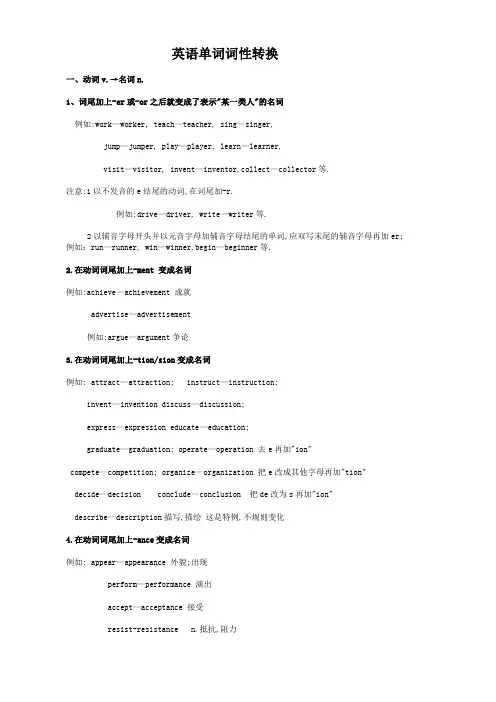
英语单词词性转换一、动词v.→名词n.1、词尾加上-er或-or之后就变成了表示"某一类人"的名词例如:work—worker, teach—teacher, sing—singer,jump—jumper, play—player, learn—learner,visit—visitor, invent—inventor,collect—collector等.注意:1以不发音的e结尾的动词,在词尾加-r.例如:drive—driver, write—writer等.2以辅音字母开头并以元音字母加辅音字母结尾的单词,应双写末尾的辅音字母再加er; 例如:run—runner, win—winner,begin—beginner等.2.在动词词尾加上-ment 变成名词例如:achieve—achievement 成就advertise—advertisement例如:argue—argument争论3.在动词词尾加上-tion/sion变成名词例如: attract—attraction; instruct—instruction;invent—invention discuss—discussion;express—expression educate—education;graduate—graduation; operate—operation 去e再加"ion"compete—competition; organize—organization 把e改成其他字母再加"tion"decide—decision conclude—conclusion 把de改为s再加"ion"describe—description描写,描绘这是特例,不规则变化4.在动词词尾加上-ance变成名词例如: appear—appearance 外貌;出现perform—performance 演出accept—acceptance 接受resist-resistance n.抵抗,阻力5.在动词词尾加-ing变成名词方法与动词变为现在分词的方法相同例如:meet—meeting build—building wait—waitingbathe—bathing say—saying谚语 mean—meaning注意:以辅音字母开头并以元音字母加辅音字母结尾的单词,应双写末尾的辅音字母再加-ing 如:swim—swimming shop—shopping begin—beginning二、动词v.→形容词adj.1.动词后面加able,以e结尾的动词则去e加able,表示具有此性质,特点或属性.例如: afford-affordable;love-lovable2.动词后面加ed,以e结尾的动词则直接加d,表示被动性的属性或特点.例如: scatter-scattered use-used3不规则的动词则必须记忆,记住其过去分词形式.规律不大,意义同b.三.名词n.→形容词adj.1.在名词后面加-y可以变成形容词尤其是一些与天气有关的名词例如: rain—rainy, cloud—cloudy, wind—windy, snow—snowy,health—healthy, luck—lucky,anger—angry guilt—guilty内疚的tourist—touristy游客多的 , salt 盐—salty 咸的silk丝绸—silky丝绸般的, sleep—sleepy 昏昏欲睡的注意:1如果以辅音字母开头并以元音字母加辅音字母结尾,这时应双写辅音字母再加"-y".如: sun—sunny, fun—funny, fog—foggy有雾的, fur—furry毛皮的2少数以不发音的e结尾的名词变为形容词时,应去掉e再加"-y".如: noise—noisy, ice—icy, shine—shiny发亮的, taste口味—tasty甜的2.名词后面加-ed,以e结尾的直接加d.例如: spot斑点—spotted有斑点的; talent—talented 有天赋的organize—organized 有组织的; balance—balanced平衡的3.一些抽象名词在词尾加-ful可以变为形容词例如:care—careful, thank—thankful, help—helpful,use—useful, meaning—meaningful4.在名词后加-less构成含有否定意义的形容词例如:care—careless粗心的, use—useless无用的hope—hopeless没希望的,home—homeless无家可归的5.一些以-ce结尾的名词,把-ce改为-t变成形容词例如: difference—different, silence—silent, confidence—confident 6.在名词后加-ly变为形容词例如: friend—friendly, love—lovely, live---lively7.在名词后加-ous变为形容词例如: danger—dangerous prosperous a 繁荣的pro 在前+sper 希望+ous 8.名词后面加-al变为形容词例如: music—musical; medicine—medical 这个比较特殊9名词后面加-able变为形容词,如果以e结尾就去e再加"-able".例如: adjust—adjustable 可调整的 value—valuable有价值的10.名词后面加-en变成形容词例如: wood—wooden 木制的 wool—woolen 羊毛的四.形容词adj.→副词adv.▲一般在形容词的词尾加-ly可以变成副词例如: quick—quickly, slow—slowly, loud—loudly, sudden—suddenly 等例如:possible—possibly, terrible—terribly。
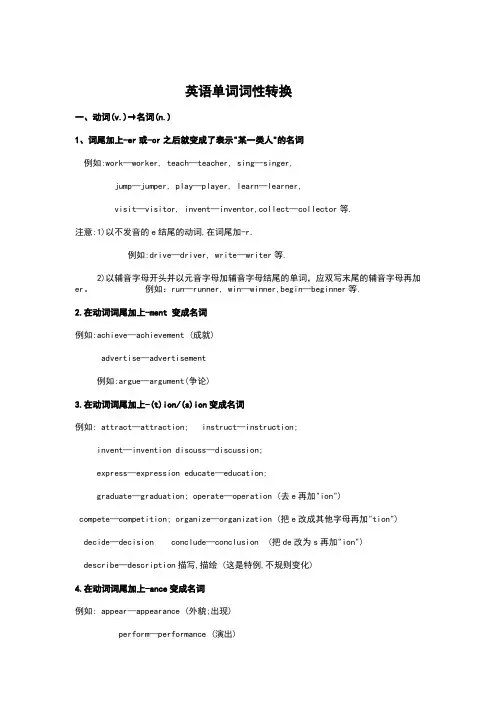
英语单词词性转换一、动词(v.)→名词(n.)1、词尾加上-er或-or之后就变成了表示"某一类人"的名词例如:work—worker, teach—teacher, sing—singer,jump—jumper, play—player, learn—learner,visit—visitor, invent—inventor,collect—collector等.注意:1)以不发音的e结尾的动词,在词尾加-r.例如:drive—driver, write—writer等.2)以辅音字母开头并以元音字母加辅音字母结尾的单词,应双写末尾的辅音字母再加er。
例如:run—runner, win—winner,begin—beginner等.2.在动词词尾加上-ment 变成名词例如:achieve—achievement (成就)advertise—advertisement例如:argue—argument(争论)3.在动词词尾加上-(t)ion/(s)ion变成名词例如: attract—attraction; instruct—instruction;invent—invention discuss—discussion;express—expression educate—education;graduate—graduation; operate—operation (去e再加"ion")compete—competition; organize—organization (把e改成其他字母再加"tion")decide—decision conclude—conclusion (把de改为s再加"ion")describe—description描写,描绘 (这是特例,不规则变化)4.在动词词尾加上-ance变成名词例如: appear—appearance (外貌;出现)perform—performance (演出)accept—acceptance (接受)resist-resistance n.抵抗,阻力5.在动词词尾加-ing变成名词 (方法与动词变为现在分词的方法相同)例如:meet—meeting build—building wait—waitingbathe—bathing say—saying(谚语) mean—meaning注意:以辅音字母开头并以元音字母加辅音字母结尾的单词,应双写末尾的辅音字母再加-ing如:swim—swimming shop—shopping begin—beginning二、动词(v.)→形容词(adj.)1.动词后面加able,以e结尾的动词则去e加able,表示具有此性质,特点或属性.例如: afford-affordable;love-lovable2.动词后面加ed,以e结尾的动词则直接加d,表示被动性的属性或特点.例如: scatter-scattered use-used3不规则的动词则必须记忆,记住其过去分词形式.规律不大,意义同(b).三.名词(n.)→形容词(adj.)1.在名词后面加-y可以变成形容词(尤其是一些与天气有关的名词)例如: rain—rainy, cloud—cloudy, wind—windy, snow—snowy,health—healthy, luck—lucky,anger—angry guilt—guilty(内疚的)tourist—touristy(游客多的) , salt (盐)—salty (咸的)silk(丝绸)—silky(丝绸般的), sleep—sleepy (昏昏欲睡的)注意:1)如果以辅音字母开头并以元音字母加辅音字母结尾,这时应双写辅音字母再加"-y".如: sun—sunny, fun—funny, fog—foggy(有雾的), fur—furry(毛皮的)2)少数以不发音的e结尾的名词变为形容词时,应去掉e再加"-y".如: noise—noisy, ice—icy, shine—shiny(发亮的), taste(口味)—tasty(甜的) 2.名词后面加-ed,以e结尾的直接加d.例如: spot(斑点)—spotted(有斑点的); talent—talented (有天赋的)organize—organized 有组织的; balance—balanced(平衡的)3.一些抽象名词在词尾加-ful可以变为形容词例如:care—careful, thank—thankful, help—helpful,use—useful, meaning—meaningful4.在名词后加-less构成含有否定意义的形容词例如:care—careless(粗心的), use—useless(无用的)hope—hopeless(没希望的),home—homeless(无家可归的)5.一些以-ce结尾的名词,把-ce改为-t变成形容词例如: difference—different, silence—silent, confidence—confident6.在名词后加-ly变为形容词例如: friend—friendly, love—lovely, live---lively7.在名词后加-ous变为形容词例如: danger—dangerous prosperous a 繁荣的(pro 在前+sper 希望+ous)8.名词后面加-al变为形容词例如: music—musical; medicine—medical (这个比较特殊)9名词后面加-able变为形容词,如果以e结尾就去e再加"-able".例如: adjust—adjustable 可调整的 value—valuable有价值的10.名词后面加-en变成形容词例如: wood—wooden 木制的 wool—woolen 羊毛的四.形容词(adj.)→副词(adv.)▲一般在形容词的词尾加-ly可以变成副词例如: quick—quickly, slow—slowly, loud—loudly, sudden—suddenly 等例如:possible—possibly, terrible—terribly。
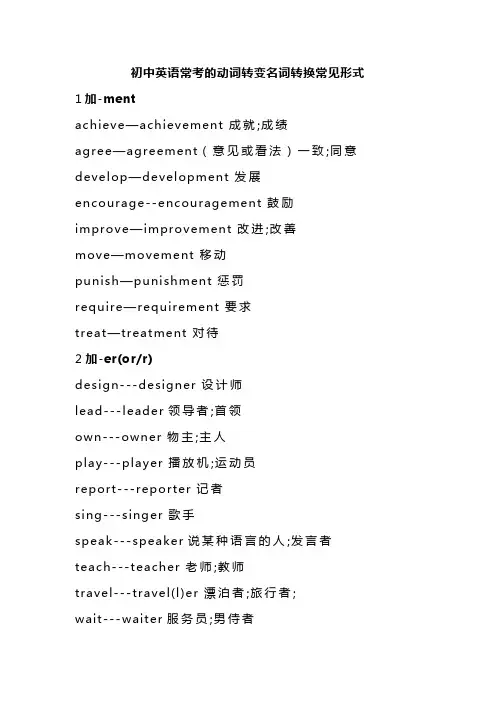
初中英语常考的动词转变名词转换常见形式1加-mentachieve—achievement 成就;成绩agree—agreement(意见或看法)一致;同意develop—development 发展encourage--encouragement 鼓励improve—improvement 改进;改善move—movement 移动punish—punishment 惩罚require—requirement 要求treat—treatment 对待2 加-er(or/r)design---designer 设计师lead---leader领导者;首领own---owner 物主;主人play---player 播放机;运动员report---reporter 记者sing---singer 歌手speak---speaker说某种语言的人;发言者teach---teacher 老师;教师travel---travel(l)er 漂泊者;旅行者;wait---waiter服务员;男侍者work---worker 工人;工作者dance---dancer舞蹈家;舞者drive---driver 驾驶员act---actor(男)演员direct---director 导演invent---inventor 发明家visit---visitor 游客;访问者3加-(t)ion 或去e加-(t)ion 或变e为a加-tion collect—collection 收集;采集;收藏品connect—connection 连接;关系direct—direction 方向;方位invent—invention 发明protect—protection 保护;保卫suggest—suggestion 建议celebrate—celebration 庆祝;庆典communicate—communication 交流;沟通congratulate—congratulation 祝贺educate—education 教育pollte—pollution 污染introduce—introduction介绍;引进produce—production制造;产量;生产4加-ingbuild—building 建筑物;房子cook—cooking 烹饪draw—drawing 图画end-—ending 结局;结尾feel—feeling 感觉;感触mean—meaning 意义;意思meet—meeting 会议;集会;见面paint—painting 油画;绘画park—parking 停车read—reading 阅读,朗读;读物say—saying 谚语;格言ski—sking 滑雪(运动)train—training 训练;培训walk—walking 步行;散步5加-ressact—actress女演员wait—waitress女服务员;女侍者6其他advise—-advice 劝告;建议choose—choice 选择;挑选die—death 死;死亡discover—discovery 发现;发觉fail—failure失败;故障;失败者;倒闭laugh—laughter 笑;笑声marry—marriage 结婚;婚姻生活please—pleasure 高兴;愉快serve—service 接待;服务succeed--success 成功;成功的人/事think—thought 思想;想法Weigh--weight 重量;分量。
英语单词词性转换的基本规律一词性变换的一般的规律1.动词(v.)→名词(n.)(a)词形不变,词性改变work, study, water, plant等可以用作动词(工作,学习,浇水,种植),也可以用作名词(工作,学习,水,植物).(b)一些动词在词尾加上-er或-or之后就变成了表示"某一类人"的名词例如:work—worker, teach—teacher, sing—singer, jump—jumper, play—player, learn—learner, visit—visitor, invent—inventor,collect—collector等.注意:1)以不发音的e结尾的动词,在词尾加-r.例如:drive—driver, write—writer等.2)以重读闭音节结尾,且末尾只有一个辅音字母的动词,应双写末尾的辅音字母,再加-er例如:run—runner, win—winner,begin—beginner等.(c)在动词词尾加上-ment 变成名词例如:achieve—achievement (成就) advertise—advertisement(广告) agree—agreement disagree—disagreementamuse—amusement (娱乐) improve—improvement(争吵)commit(奉献)—commitment develop—development (发展)depart—department (局,部) govern(统治)—government(政府)manage—management (管理) equip—equipment (装备)有些单词比较特殊,需把动词后的e去掉再加ment.例如:argue—argument(争论)(d)在动词词尾加上-(t)ion/(s)ion变成名词例如: attract—attraction; instruct—instruction;invent—invention discuss—discussion;express—expression educate—education;graduate—graduation; operate—operation (去e再加"ion")compete—competition; organize—organization (把e改成其他字母再加"tion") decide—decision conclude—conclusion (把de改为s再加"ion")describe—description描写,描绘(这是特例,不规则变化)(e)在动词词尾加上-ance变成名词例如: appear—appearance (外貌;出现) perform—performance (演出)accept—acceptance (接受)(f)在动词词尾加-ing变成名词(方法与动词变为现在分词的方法相同)例如: meet—meeting build—building wait—waitingbathe—bathing say—saying(谚语) mean—meaningend —ending train —training wash—washing注意:以重读闭音节结尾,且末尾只有一个辅音字母的动词,应双写末尾的辅音字母,再加-ing如:swim—swimming shop—shopping begin—beginning(g)其他一些比较特殊的变化例如: Beg(乞讨)—beggar(乞丐) behave(行为举止)—behaviorknow(知道)—knowledge(知识) fly—flight (飞行)heat (加热)—heat(热量) hit (撞击)—hit( 轰动一时的人或物,碰撞)mix (混合)—mixture(混合物) press(按,压)—pressure(压力)sit(坐)—seat (座位) succeed—success(成功)tour—tour(旅游)/ tourist (游客)2.动词(v.)→形容词(adj.)(a)动词后面加able,以e结尾的动词则去e加able,表示具有此性质,特点或属性.例如: afford-affordable;love-lovable(b)动词后面加ed,以e结尾的动词则直接加d,表示被动性的属性或特点.例如: scatter-scattered use-used(c)不规则的动词则必须记忆,记住其过去分词形式.规律不大,意义同(b).3.名词(n.)→形容词(adj.)(a)在名词后面加-y可以变成形容词(尤其是一些与天气有关的名词)例如: rain—rainy, cloud—cloudy, wind—windy, snow—snowy,health—healthy, luck—lucky,anger—angry guilt—guilty(内疚的)tourist—touristy(游客多的) , salt (盐)—salty (咸的)silk(丝绸)—silky(丝绸般的), sleep—sleepy (昏昏欲睡的)注意:1)如果以重读闭音节结尾,且词尾只有一个辅音字母,这时应双写辅音字母再加"-y". 如: sun —sunny, fun—funny, fog—foggy(有雾的), fur—furry(毛皮的)2)少数以不发音的e结尾的名词变为形容词时,应去掉e再加"-y".如: noise—noisy, ice—icy, shine—shiny(发亮的), taste(口味)—tasty(甜的)(b)名词后面加-ed,以e结尾的直接加d.例如: spot(斑点)—spotted(有斑点的); talent—talented (有天赋的)organize—organized 有组织的; balance—balanced(平衡的)(c)一些抽象名词在词尾加-ful可以变为形容词例如:care—careful, thank—thankful, help—helpful,use—useful, meaning—meaningful(d)在名词后加-less构成含有否定意义的形容词例如:care—careless(粗心的), use—useless(无用的)hope—hopeless(没希望的),home—homeless(无家可归的)(e)一些以-ce结尾的名词,把-ce改为-t变成形容词例如: difference—different, silence—silent, confidence—confident(f).在名词后加-ly变为形容词例如: friend—friendly, love—lovely, live---lively(g).在名词后加-ous变为形容词例如: danger—dangerous(h)名词后面加-al变为形容词例如: music—musical; medicine—medical (这个比较特殊)(i)名词后面加-able变为形容词,如果以e结尾就去e再加"-able".例如: adjust—adjustable 可调整的value—valuable有价值的(j)名词后面加-en变成形容词例如: wood—wooden 木制的wool—woolen 羊毛的(k)一些表示国家的名词可以在词尾加-ese, -ish或-n构成表示国籍,语言的形容词例如:China—Chinese, Japan—Japanese, England—English,America—American, India—Indian, Australia —Australian (注意Canada—Canadian)4.形容词(adj.)→副词(adv.)▲一般在形容词的词尾加-ly可以变成副词例如: quick—quickly, slow—slowly, loud—loudly, sudden—suddenly 等但是,以下几点值得注意:(a) 一些以"辅音字母+y"结尾的形容词,要把y改为i再加-ly例如: happy—happily, angry—angrily, lucky—luckily, heavy—heavily, noisy—noisily(b) 有些以-ble或-le结尾的形容词,去掉e加-y例如:possible—possibly, terrible—terribly(c)少数以e结尾的形容词,要去掉e再加-ly例如: true—truly但绝大多数以e结尾的形容词仍然直接加-ly 例如: polite—politely, wide—widely(d)以-l结尾的形容词变为副词时要在词尾加-ly,以-ll结尾的才在词尾只加-y.例如: usual—usually, careful—carefully, useful—usefullyfull—fully (以-ll结尾的才只加y)二. 派生:指由一个词根加上前缀和(或)后缀构成另一个词的构词形式。
动词变名词转换规则
一、一般情况
1. 在动词词尾直接加 -er或 -or,变成表示“做某事的人”的名词。
- 例如:
- teach(教)→teacher(教师)
- work(工作)→worker(工人)
- visit(参观;访问)→visitor(参观者;访问者)
- 一般情况下,以 -e结尾的动词直接加 -r,如:write(写)→writer(作家)。
2. 在动词词尾加 -ion或 -tion或 -ation或 -sion等后缀,变成表示动作或状态的名词。
- 例如:
- act(行动)→action(行动)
- communicate(交流)→communication(交流)
- educate(教育)→education(教育)
- decide(决定)→decision(决定)
3. 一些动词在词尾加 -ing变成名词,表示与该动作相关的事物或活动。
- 例如:
- build(建造)→building(建筑物;大楼)
- paint(绘画)→painting(绘画;油画)
- meet(遇见;开会)→meeting(会议)
二、特殊情况
1. 有些动词需要改变词干中的元音字母,然后再加后缀变成名词。
- 例如:
- sing(唱歌)→singer(歌手),这里是把“i”变成“er”。
- drive(驾驶)→driver(司机),把“i”变成“er”。
2. 某些动词有不规则的名词形式。
- 例如:
- die(死亡)→death(死亡)
- know(知道)→knowledge(知识)。
英语名词化举例在日常生活和学术领域中,我们经常会遇到将其他词类的词语转变为名词的现象,这被称为名词化。
名词化可以使语言更加精准、简洁,并且有利于思维的分析和表达。
下面是一些英语名词化的举例,以帮助大家更好地理解和运用这一语言现象。
1. Conversion (转换)Conversion是指通过词类的变化将某一词语转变为名词。
例如,动词"perform"可以转变为名词"performance",表示行为或表现的结果。
其他例如:"success"来自动词"succeed","failure"来自动词"fail"等等。
2. Derivation (派生)Derivation是通过在词根或词干前或后加上前缀或后缀来形成名词。
例如,动词“inform”的名词形式是“information”,形容词“comfortable”的名词形式是“comfort”。
3. Compounding (合成)Compounding是指通过将两个或多个词组合在一起形成新的名词。
例如,"sun"和"flower"合成为"sunflower",表示向日葵。
其他例如:"black"和"board"合成为"blackboard",表示黑板等等。
4. Abbreviation (缩写)Abbreviation是指将一个长词或短语缩写为较短的形式来表示名词。
例如,"UN"是United Nations(联合国)的缩写,"TV"是Television(电视)的缩写等等。
5. Acronyms (首字母缩略词)Acronyms是指通过将一个长词的首字母组合在一起形成新的名词。
句型转换:将句子中的动词改为名词或形容词动词在句子中起到了表达动作或状态的作用,但是有时候我们希望将动词转换为名词或形容词,以丰富句子的表达方式。
本文将介绍一些常见的句型转换方法,帮助您在写作中更灵活地运用语言。
1. 名词化转换将动词转换为名词,可以使句子更加简练、明确,并且强调动作的结果或状态。
示例:- 动词句子:他喜欢跑步。
- 名词化句子:跑步是他的爱好。
在上述示例中,动词"喜欢"被转换为名词"爱好",整个句子更专注于描述他的兴趣爱好。
2. 形容词化转换将动词转换为形容词,可以用来形容主语的特征、性质或状态。
示例:- 动词句子:他打篮球非常好。
- 形容词化句子:他的篮球水平非常高。
在上述示例中,动词"打"被转换为形容词"高",用来形容主语的篮球水平。
3. 动词形容词化转换有时候,我们可以将动词转换为形容词,并加上合适的后缀或词组,以形容主语的特征或状态。
示例:- 动词句子:她唱歌很动听。
- 形容词化句子:她的歌声动听动人。
在上述示例中,动词"唱"被转换为形容词"动听",形容主语的歌声特征,并加上了后缀"动人"以强调感染力。
总结通过将动词转换为名词或形容词,我们可以为句子增加多样性和表达力。
在实际应用中,根据句子的意思和所需要表达的重点,选择合适的转换方法,能够使文笔更加清晰明了。
希望以上方法能够在您的写作中派上用场!。
英语单词词性转换The Standardization Office was revised on the afternoon of December 13, 2020英语单词词性转换一、动词(v.)→名词(n.)1、词尾加上-er或-or之后就变成了表示"某一类人"的名词例如:work—worker, teach—teacher, sing—singer,jump—jumper, play—player, learn—learner,visit—visitor, invent—inventor,collect—collector等.注意:1)以不发音的e结尾的动词,在词尾加-r.例如:drive—driver, write—writer等.2)以辅音字母开头并以元音字母加辅音字母结尾的单词,应双写末尾的辅音字母再加er。
例如:run—runner, win—winner,begin—beginner 等.2.在动词词尾加上-ment 变成名词例如:achieve—achievement (成就)advertise—advertisement例如:argue—argument(争论)3.在动词词尾加上-(t)ion/(s)ion变成名词例如: attract—attraction; instruct—instruction;invent—invention discuss—discussion;express—expression educate—education;graduate—graduation; operate—operation (去e再加"ion")compete—competition; organize—organization (把e改成其他字母再加"tion")decide—decision conclude—conclusion (把de改为s再加"ion")describe—description描写,描绘 (这是特例,不规则变化)4.在动词词尾加上-ance变成名词例如: appear—appearance (外貌;出现)perform—performance (演出)accept—acceptance (接受)resist-resistance n.抵抗,阻力5.在动词词尾加-ing变成名词 (方法与动词变为现在分词的方法相同)例如:meet—meeting build—building wait—waitingbathe—bathing say—saying(谚语) mean—meaning注意:以辅音字母开头并以元音字母加辅音字母结尾的单词,应双写末尾的辅音字母再加-ing如:swim—swimming shop—shopping begin—beginning二、动词(v.)→形容词(adj.)1.动词后面加able,以e结尾的动词则去e加able,表示具有此性质,特点或属性.例如: afford-affordable;love-lovable2.动词后面加ed,以e结尾的动词则直接加d,表示被动性的属性或特点.例如: scatter-scattered use-used3不规则的动词则必须记忆,记住其过去分词形式.规律不大,意义同(b).三.名词(n.)→形容词(adj.)1.在名词后面加-y可以变成形容词(尤其是一些与天气有关的名词)例如: rain—rainy, cloud—cloudy, wind—windy, snow—snowy,health—healthy, luck—lucky,anger—angry guilt—guilty(内疚的)tourist—touristy(游客多的) , salt (盐)—salty (咸的)silk(丝绸)—silky(丝绸般的), sleep—sleepy (昏昏欲睡的)注意:1)如果以辅音字母开头并以元音字母加辅音字母结尾,这时应双写辅音字母再加"-y".如: sun—sunny, fun—funny, fog—foggy(有雾的), fur—furry(毛皮的)2)少数以不发音的e结尾的名词变为形容词时,应去掉e再加"-y".如: noise—noisy, ice—icy, shine—shiny(发亮的), taste(口味)—tasty(甜的)2.名词后面加-ed,以e结尾的直接加d.例如: spot(斑点)—spotted(有斑点的); talent—talented (有天赋的)organize—organized 有组织的; balance—balanced(平衡的)3.一些抽象名词在词尾加-ful可以变为形容词例如:care—careful, thank—thankful, help—helpful,use—useful, meaning—meaningful4.在名词后加-less构成含有否定意义的形容词例如:care—careless(粗心的), use—useless(无用的)hope—hopeless(没希望的),home—homeless(无家可归的)5.一些以-ce结尾的名词,把-ce改为-t变成形容词例如: difference—different, silence—silent, confidence—confident6.在名词后加-ly变为形容词例如: friend—friendly, love—lovely, live---lively7.在名词后加-ous变为形容词例如: danger—dangerous prosperous a 繁荣的(pro 在前+sper 希望+ous)8.名词后面加-al变为形容词例如: music—musical; medicine—medical (这个比较特殊)9名词后面加-able变为形容词,如果以e结尾就去e再加"-able".例如: adjust—adjustable 可调整的 value—valuable有价值的10.名词后面加-en变成形容词例如: wood—wooden 木制的 wool—woolen 羊毛的四.形容词(adj.)→副词(adv.)▲一般在形容词的词尾加-ly可以变成副词例如: quick—quickly, slow—slowly, loud—loudly, sudden—suddenly 等例如:possible—possibly, terrible—terribly。